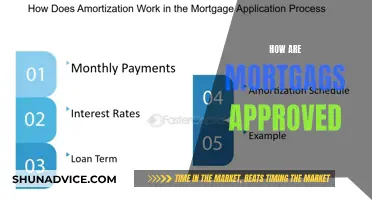
Closing costs are the fees and expenses paid at the end of a real estate transaction, which can add up to thousands of dollars. They can be included in your mortgage loan, which is also known as financing your closing costs. This can be advantageous for buyers low on cash, as it provides short-term financial relief by removing the need to pay upfront. However, it is important to note that these fees are still paid over the life of the loan, potentially costing more in the long run due to interest. Whether or not to roll closing costs into a home loan depends on an individual's circumstances, as it can increase the loan-to-value ratio, impacting the amount of equity in the home.
| Characteristics | Values |
|---|---|
| Pros | More cash in hand, don't need to pay upfront, short-term financial relief |
| Cons | Pay interest on closing costs over the life of the loan, increase loan-to-value ratio, higher monthly interest payments, increase DTI ratio |
| Types of Loans | Conventional, FHA, USDA, VA |
| Who Pays | Buyers usually pay most of the fees, but sellers can contribute up to 6% of the home value |
| Closing Costs Include | Origination fees, recording fees, title insurance, appraisal fee, property taxes, homeowners insurance, mortgage points |
| No-Closing-Cost Options | Higher interest rate, "buy up" the interest rate, gift money from friends and family, grants and loans |
What You'll Learn

Pros and cons of rolling closing costs into a mortgage
Closing costs are the fees and expenses paid at the end of a real estate transaction. They can amount to thousands of dollars and are an important part of the home-buying process.
Depending on the lender and loan type, there may be instances where you can roll your closing costs into the mortgage itself. This is also known as financing your closing costs. While this option means you will pay interest on the closing costs over the life of the loan, it can be a good option if you want a lower rate but cannot afford the upfront fees to refinance.
Pros
- You will spend less money out of pocket and keep more cash in hand, which can be helpful if you are low on cash.
- You won't have to deplete your cash reserves to buy a home, and you can use the funds to meet other financial needs and goals, such as paying down debt or improving your DTI.
- You can buy a home sooner without having to wait until you've saved for closing costs on top of the down payment.
- You can avoid paying closing costs upfront on closing day.
Cons
- You will pay interest on the closing costs over the life of the loan, which means you will ultimately pay more than if you had paid the closing costs upfront.
- By adding closing costs to your new mortgage balance, you are increasing the loan-to-value (LTV) ratio. Increasing the LTV lowers the amount of equity in your home, which means less profit when you sell your home. You would also have less equity if you wanted to take out a home equity loan.
- In some instances, increasing the LTV ratio may result in you having to pay private mortgage insurance, which can add a few hundred dollars to your monthly mortgage payment.
It is important to note that not all closing costs can be financed in the mortgage loan, and different loan programs have different rules about rolling in closing costs. It is also worth mentioning that rolling closing costs into a mortgage does not mean you avoid paying them; it simply means you don't have to pay them upfront.
MyFICO's Mortgage Accuracy: Is It Reliable?
You may want to see also

How to pay less on closing costs
Closing costs are the final fees you pay to finalise your home purchase and take ownership of your new home. These fees are paid to the mortgage company and other vendors. They can add up quickly and represent a significant chunk of money, typically between 2% and 6% of the mortgage. For example, on a $350,000 loan, closing costs can range from $7,000 to $21,000.
Shop around for the lowest lender fees
Closing costs can vary depending on the lender, so it's worth shopping around to find the lowest fees. Compare offers from multiple lenders and choose the one with the lowest-cost offer. You can also ask your lender to reduce the origination charges or waive certain aspects of the loan origination fee, such as application or processing fees.
Ask the seller to contribute
You can ask the seller to cover some of the closing costs, often called a seller concession. This strategy may not work in a strong seller's market but is common nonetheless. According to the National Association of Realtors, 24% of home sellers offered some form of concession to their buyer in 2024.
Schedule your closing date for later in the month
Closing costs include per diem, prepaid interest costs for each day between the closing day and the start of the next month. So, if you close on the 29th of June, you will pay for only one day of interest per diem, whereas closing on the 2nd of June would mean paying 28 days of interest.
Choose your vendors
Your lender will provide a list of preferred vendors for services such as pest inspection, survey, and title search. However, you are not required to use these vendors and can shop around for lower-priced alternatives.
Look into special lending programs and rebates
Some lenders offer no-closing-cost loan options, usually in exchange for a higher interest rate. While this saves you money upfront, it will cost you more in the long run. Many cities, counties, and states have down payment and closing cost assistance programs for qualified homebuyers, especially first-time homebuyers. Additionally, many banks offer rebates and rewards discount programs for customers taking out mortgages.
Understand the fees and shop around
Your lender is required to provide a loan estimate within three days of completing a mortgage application, detailing the various fees. Understand the fees you are expected to pay, and shop around for the best deals. For example, you can shop around for title insurance, home inspection, and survey services to get the best price.
Remember, while some closing costs are negotiable, others are set in stone. It's important to carefully review all the fees and understand which ones you may be able to reduce or waive.
Mortgage Surveys: Accurate or Fiction?
You may want to see also

Negotiating with the seller to pay closing costs
Firstly, understand that the seller's motivation is key. Start with a low-ball offer to gauge their willingness to sell. While this can give you leverage in the negotiation, it's also risky as it may insult the seller and cause them to refuse to sell to you. Consult with your agent to decide if this is the right approach, and consider how much you want the home before taking this route.
Next, be aware of the market conditions. If it's a seller's market, you may have less room to negotiate, while in a buyer's market, you could have more leverage. Additionally, certain loan types have limits on how much the seller can contribute to closing costs. For conventional loans, if the down payment is less than 10%, sellers can cover up to 3% of closing costs, whereas if the down payment is more than 25%, they can contribute up to 9%. For FHA and VA loans, the limits are 6% and 4%, respectively.
Now, let's discuss specific negotiation tactics. One option is to offer a higher price for the home in exchange for the seller covering your closing costs. This is similar to rolling the closing costs into your loan, but you may be able to negotiate a lower amount. It's recommended to let your agent handle communication with the seller to maintain a professional distance and avoid appearing too enthusiastic about the house.
Another strategy is to negotiate a reduction in the purchase price, which can then cover your closing costs. For example, if the house is listed at $200,000, you could offer 95% of the sales price ($190,000) and ask the seller to pay the remaining 5% towards closing costs. Alternatively, you could make a full-price offer but request that the seller covers a certain percentage of the closing costs.
Remember, successful negotiations often involve meeting in the middle. If the seller is hesitant about covering all closing costs, they may agree to other concessions, such as a smaller down payment, a lower earnest money deposit, or a reduction in the purchase price. Additionally, some sellers may be more inclined to agree if the sale can be closed quickly, so be prepared with your pre-approval letter and down payment amount.
Lastly, don't forget about negotiating with your lender. While certain closing costs are fixed, others are variable and can be reduced or waived. Lender fees, for example, can vary significantly, so it's worth asking if they can be lowered or if there are any available rebates or incentives.
By combining these strategies and staying informed about market conditions and loan restrictions, you can effectively negotiate with the seller to pay closing costs and secure a better deal for yourself.
Trulia Mortgage Estimates: How Reliable Are They?
You may want to see also

No-closing-cost loans
Closing costs are a grouping of fees charged to obtain a home loan and typically include fees for the home inspection, home appraisal, and title services, as well as expenses associated with originating the mortgage, among others. These fees will vary based on a number of factors and are very specific to each individual loan. They can include property taxes, homeowner's insurance, and mortgage insurance. Closing costs can range from 2% to 6% of the loan amount, so they can be a significant expense when buying a home.
No-closing-cost mortgages have both advantages and disadvantages. On the positive side, they mean less immediate outlay for the buyer. They can be a good option when you want a lower rate but can't afford the upfront fees to refinance. They can also allow you to move into your home sooner, as you will need to save less money. However, over the lifetime of the loan, you will pay more overall. This is because you will be paying interest on the closing costs on top of the interest for the cost of the home loan.
There are a few different ways to structure a no-closing-cost mortgage:
- The costs are added to your loan: You finance the costs as part of your mortgage and pay for them, with interest, over the full loan term.
- You pay a higher interest rate on your loan: This is also known as 'buying up' the interest rate, where the lender covers the closing costs in exchange for a higher interest rate over the life of the loan.
- The seller pays some or all of the closing costs: In a buyer's market, you may be able to negotiate for the seller to pay the closing costs.
Zillow's Mortgage Estimates: Accurate or Misleading?
You may want to see also

How to pay closing costs with a gift fund
When it comes to purchasing a home, closing costs can be a significant expense. Fortunately, it is possible to use gift money to help cover these costs. Here is a step-by-step guide on how to pay closing costs with a gift fund:
Determine Eligibility
Firstly, it is important to understand the eligibility criteria for using gift funds for closing costs. Lenders typically allow gift money to be used for closing costs, but there are rules regarding who can provide the funds and how they are documented. Gift funds are usually only permitted from close relatives, such as family members and romantic partners. However, some lenders may also accept gifts from close friends, employers, charitable organizations, or government agencies. It is essential to check with your specific lender to confirm their requirements.
Provide Documentation
If you are using gift funds for closing costs, you will need to provide proper documentation. This typically includes a gift letter, which states the donor's contact information, their relationship to you, the gift amount, and a confirmation that no repayment is expected. Additionally, you may need to provide evidence of the fund's source, such as the donor's bank statements showing the withdrawal and deposit of the gift.
Transfer Funds Properly
The recommended way to transfer gift funds is by wiring them directly from the donor to the escrow company at the time of closing. This method helps to create a clear paper trail and avoids the need to provide extensive bank statements and documentation from both the recipient and the donor.
Understand Tax Implications
It is important to note that gift funds may have tax implications for the donor. The relative or individual providing the gift should be aware of potential tax liabilities associated with gifting large sums of money. Be sure to review the relevant tax laws and consult a tax professional if necessary.
Strategic Use of Gift Funds
When using gift funds for closing costs, consider using the money to pay for specific expenses that will provide the most benefit. For example, you can use the gift funds to pay for the Upfront Mortgage Insurance Premium (for FHA loans) or to reduce the interest rate on your mortgage, which can save you thousands of dollars in interest over time.
In conclusion, while gift funds can be a helpful way to cover closing costs when purchasing a home, it is important to follow the proper steps to ensure compliance with lender requirements and tax regulations. By understanding the eligibility criteria, providing the necessary documentation, and strategically using the gift funds, you can effectively leverage this option to your advantage when buying a home.
Discover Scorecard Mortgage: How Accurate Are These Assessments?
You may want to see also
Frequently asked questions
Closing costs are the fees and expenses that are paid at the closing of a real estate transaction. They are charged when you buy or sell a property and can include third-party fees such as title search fees, home appraisal fees, lender fees, attorney fees, taxes, and insurance premiums.
Yes, it is possible to roll closing costs into your mortgage, but it depends on the type of loan and the lender's criteria. Conventional, FHA, USDA, and VA loans may allow you to roll closing costs into your mortgage. However, it is important to note that you will pay interest on these costs over the life of the loan, which can make it more expensive in the long run.
Rolling closing costs into your mortgage can provide short-term financial relief as you won't need to pay the fees upfront. It can be a good option if you want to maintain your savings or if you are a first-time homebuyer who may not have the cash on hand to pay the closing costs upfront.
By rolling closing costs into your mortgage, you will pay interest on those costs over the life of the loan, which can increase the overall cost. Additionally, it can increase your loan-to-value ratio, resulting in less equity in your home and potentially making it more difficult to secure other loans.







